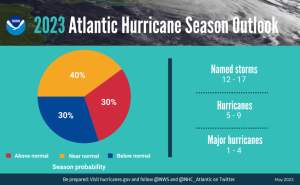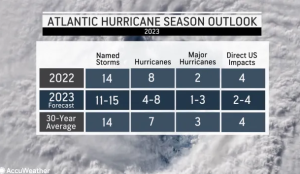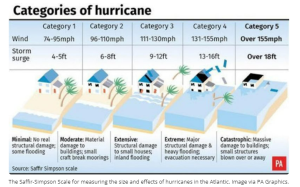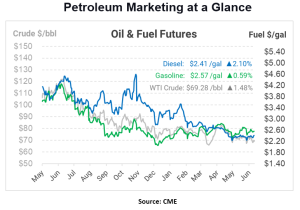
It’s Hurricane Season – 3 Forecasts to Prepare You
The 2023 hurricane season has officially started, marking a six-month period of potential storms and threats along the eastern half of the United States (and occasionally Canada). Reflecting on the previous year, markets experienced a slow start which quickly escalated into a record-breaking season. It is important for businesses – especially those relying on continuous fuel supply – to prepare ahead. Having an emergency plan and staying informed about the weather forecast can minimize the impact of potential hurricanes, allowing operations to stay up and running.
The season typically runs from June 1st to November 30th, with the most active period falling between August and October. During these months, coastal areas and communities face a high risk of being hit by strong hurricanes. In today’s article, we’re bringing up some forecaster’s predictions and the importance of an emergency fuel plan.
Keep a close eye on the weather forecast
According to NOAA’s federal forecasters, there is a 40% chance that storm activity will remain close to the average this season. Their forecast suggests that we can expect between 12 and 17 named storms, with at least 39 mph wind speeds. Five to nine storms are likely to intensify into hurricanes, with one to four reaching Category 3 status, with winds exceeding 111 mph.

AccuWeather’s meteorologists have released a forecast that aligns closely with NOAA’s predictions. They expect the development of 11 to 15 named storms, with four to eight of them gaining hurricane strength. Additionally, they foresee one to three hurricanes reaching Category 3. Still recovering from Hurricane Ian’s impacts, Florida remains at a higher risk than other regions.

The meteorologists at Colorado State University expect a slightly less active hurricane season this year. Their mid-April forecast projects the formation of 13 storms, six hurricanes, and two major hurricanes in the Atlantic. This prediction stems from an evolving El Niño pattern, which typically creates less favorable conditions for storm development.

While there is a near-average probability of major hurricanes hitting the US, coastal residents are reminded that it takes just one landfalling hurricane to make the season active for their area and that the impact of a single storm can be devastating. That’s the reason why having an emergency plan in place is crucial for many companies.
Have an Emergency Response Plan
It’s important to rely on a fuel supplier you can trust. Businesses need to know if their supplier has the ability to deliver the fuel they need when they need it, no matter what. This is where a dependable and reliable fuel supplier steps in. Just like you protect your business assets with insurance, you’d want to protect your company’s ability to keep going, serve your customers, and make money by ensuring you won’t run out of fuel.
If a major hurricane hits, many companies must keep their backup generators running to power their buildings and equipment. If there are no local fuel or delivery services around, an Emergency Response program from a supplier could be a lifesaver. They will provide the necessary fuel to keep generators and other equipment working until the power’s back on.
Mansfield’s Emergency Response Program
Mansfield’s Emergency Response Fuel Program is designed for organizations that can’t afford downtime. Whether companies’ requirements are for backyard, mobile, or generator fueling for facilities or vehicles, Mansfield’s expansive delivery network and fuel supply points can ensure the business stays on track.
Mansfield delivers a tailored solution for emergency fueling, allowing the organizations to operate smoothly, even in case of unforeseen situations. The program is designed to be flexible, enabling customers to adapt it according to their needs. Options include temporary fuel storage tanks, dedicated fuel trucks and supply, retail fleet cards, and proactive maintenance of tanks and generators.
Contact us today to learn more about our Emergency Response Program.

This article is part of Daily Market News & Insights
MARKET CONDITION REPORT - DISCLAIMER
The information contained herein is derived from sources believed to be reliable; however, this information is not guaranteed as to its accuracy or completeness. Furthermore, no responsibility is assumed for use of this material and no express or implied warranties or guarantees are made. This material and any view or comment expressed herein are provided for informational purposes only and should not be construed in any way as an inducement or recommendation to buy or sell products, commodity futures or options contracts.





